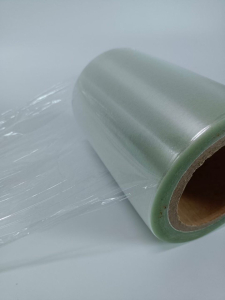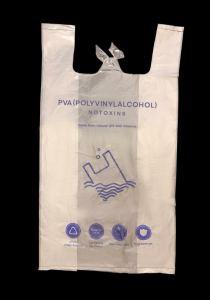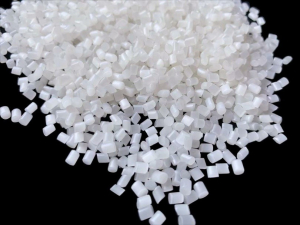Bioplastics International Launches Water Soluble PVA Replacement for Plastics
Bioplastics International creates water soluble PVA products to replace plastics, to stop the plastic pollution of our oceans and beaches.
Scottsdale, AZ, February 07, 2022 --(PR.com)-- Our oceans have become the world's largest landfill, accumulating more than 13 million tons of plastic annually, according to Bioplastics International, an Arizona-based producer of water soluble PVA and bio resins from plant starches. In an attempt to curb the overwhelming plastic pollution of our oceans, Bioplastics International has launched a water soluble replacement for petroleum based plastics.
Garrett Valentino, CEO of Bioplastics International, said that conveying knowledge about PVA is difficult amid a climate of greenwashing by industry marketers. Even so, the market must be constantly informed about the advantages of PVA from the standpoints of the environment and customers.
“Right now, we’re involved in the huge effort of informing the rest of the world about our water soluble PVA bags and packaging films. This is not a simple task, especially when the majority of people believe we’re just using a catchphrase to promote bioplastic. People are unable to grasp the existence of a bag or film that are both safe and will dissolve in water in minutes. Because the majority of people have never heard of PVA, we have our job cut out for us! We’re getting a lot of positive feedback, and every plastic bag we can replace with PVA is a win win situation,” Valentino said.
Describing PVA, he added that the hydrophilic synthetic polymer is manufactured by the hydrolysis of polyvinyl acetate, which is formed by the polymerization of vinyl acetate. Valentino stated, "Through crystallization, we can control the temperature when our PVA will dissolve in water, minutes, to months."
“Our PVA is made from refined biogas, renewable natural gas and minerals, contains no plastic, no toxins, no heavy metals, and no bioplastic. It dissolves in water in minutes, leaving behind carbon dioxide and water. It does not leave behind any microplastics or any residues,” he affirmed.
He stressed that PVA is safe for human consumption, having been approved by the US FDA, and is currently used as a food additive and in the medical industry, in “advanced biomedical applications such as wound dressing, wound management, drug delivery systems, artificial organs, and contact lenses.” All this is due to its ability to retain water almost as well as natural cells, as well as its biocompatible, biodegradable, and non-toxic behavior, elaborated Valentino.
Furthermore, PVA is non-toxic to animals, claims Valentino, adding that it can be eaten by fish, birds, marine and land animals, and it will safely pass through their digestive systems.
The water-soluble polymer can be mass produced in vast quantities and can be used for blown films, extrusion, or injection molding processes, virtually any product can be made from PVA, he said.
PVA: neither a fad nor a bioplastic
Bioplastics have become a movement, according to Valentino, due to increased public awareness over marine waste, consumer interest, and legislative regulations against polluting plastics. Nonetheless, studies have shown that bioplastics do not biodegrade in landfills, despite the fact that they may be crucial in efforts to defossilise the sector. They are also expensive to manufacture, and if not properly disposed of, can contaminate the recycling processes.
Valentino stated that his company, which also produces polylactic acid (PLA)-based products, has focused on manufacturing PVA items in order to help mitigate the problem of marine litter.
“We continue to make compostable PLA and PBAT items, but our new focus is on saving our oceans from the plague of plastic waste,” he said.
He said that the current ocean plastic waste issue is a serious one and must be immediately addressed. "We can not ignore this, if nothing is done, by 2050 we will have more plastic in our oceans than fish."
“Only about 10% of the world’s plastics are recycled. The majority of them will end up in landfills or in the oceans. If left for hundreds of years in landfills, plastics will leak methane gas into our environment. Methane is a powerful greenhouse gas with a warming potential 20 times greater than oxygen.”
He said that in view of the above, the company decided to develop PVA bags, films, and products, which are “stronger, and more durable, than petroleum based plastics.” Furthermore, PVA bags and products do not need to be recycled. They can be washed down the sink drain. If they enter the petroleum based recycling stream, they will not contaminate it. PVA waste in landfills will completely disintegrate into carbon dioxide and water as soon as rain or moisture penetrates the soil, he said.
At this point, Valentino also stressed that PVA is not a bioplastic although there is the tendency to “misidentify” it as such, and this, he observed, is hindering the patronage of the product.
“Potential buyers or supermarkets may mistakenly believe that our PVA bags are merely a new name for bioplastic bags, causing them to show little interest. Our PVA bags have nothing in common with bioplastic bags - they contain no plant starch, lactic acid or any other bioplastic component. A bioplastic bag will be present in the environment or oceans for years.”
Valentino says the company is “opposed to the use of paper or bioplastic bags, which can last for years once they enter the environment.”
“People cannot comprehend that there is a bag or product available that will only last minutes in the ocean and hours in a landfill,” he explained.
Light at the end of the tunnel with PVA
“Our pricing is a little more than petroleum plastic, but in my opinion, are we allowed to attach a cost to the preservation of our seas, the lives of marine animals, and reduction of greenhouse gas emissions?” he ponders.
In view of this, Bioplastics International intends to continue advocating the reduction of plastic waste and one way is through mandatory use of PVA bags. “We would like to see the usage of PVA bags made compulsory in supermarkets, restaurants, and other businesses. Our goal is to never see another plastic bag on a beach, to never have a sea turtle or other wildlife die as a result of eating plastic bags, and to never have humans infested with microplastics,” Valentino emphasized.
Furthermore, Bioplastics International also intends to push PVA in the medical, pharmaceutical, and cruise line industry sectors.
“This is a good start,” he noted, concluding that PVA products are not the full solution to saving the planet from complete plastic destruction, however, water soluble is the way of the future, said Valentino.
Garrett Valentino, CEO of Bioplastics International, said that conveying knowledge about PVA is difficult amid a climate of greenwashing by industry marketers. Even so, the market must be constantly informed about the advantages of PVA from the standpoints of the environment and customers.
“Right now, we’re involved in the huge effort of informing the rest of the world about our water soluble PVA bags and packaging films. This is not a simple task, especially when the majority of people believe we’re just using a catchphrase to promote bioplastic. People are unable to grasp the existence of a bag or film that are both safe and will dissolve in water in minutes. Because the majority of people have never heard of PVA, we have our job cut out for us! We’re getting a lot of positive feedback, and every plastic bag we can replace with PVA is a win win situation,” Valentino said.
Describing PVA, he added that the hydrophilic synthetic polymer is manufactured by the hydrolysis of polyvinyl acetate, which is formed by the polymerization of vinyl acetate. Valentino stated, "Through crystallization, we can control the temperature when our PVA will dissolve in water, minutes, to months."
“Our PVA is made from refined biogas, renewable natural gas and minerals, contains no plastic, no toxins, no heavy metals, and no bioplastic. It dissolves in water in minutes, leaving behind carbon dioxide and water. It does not leave behind any microplastics or any residues,” he affirmed.
He stressed that PVA is safe for human consumption, having been approved by the US FDA, and is currently used as a food additive and in the medical industry, in “advanced biomedical applications such as wound dressing, wound management, drug delivery systems, artificial organs, and contact lenses.” All this is due to its ability to retain water almost as well as natural cells, as well as its biocompatible, biodegradable, and non-toxic behavior, elaborated Valentino.
Furthermore, PVA is non-toxic to animals, claims Valentino, adding that it can be eaten by fish, birds, marine and land animals, and it will safely pass through their digestive systems.
The water-soluble polymer can be mass produced in vast quantities and can be used for blown films, extrusion, or injection molding processes, virtually any product can be made from PVA, he said.
PVA: neither a fad nor a bioplastic
Bioplastics have become a movement, according to Valentino, due to increased public awareness over marine waste, consumer interest, and legislative regulations against polluting plastics. Nonetheless, studies have shown that bioplastics do not biodegrade in landfills, despite the fact that they may be crucial in efforts to defossilise the sector. They are also expensive to manufacture, and if not properly disposed of, can contaminate the recycling processes.
Valentino stated that his company, which also produces polylactic acid (PLA)-based products, has focused on manufacturing PVA items in order to help mitigate the problem of marine litter.
“We continue to make compostable PLA and PBAT items, but our new focus is on saving our oceans from the plague of plastic waste,” he said.
He said that the current ocean plastic waste issue is a serious one and must be immediately addressed. "We can not ignore this, if nothing is done, by 2050 we will have more plastic in our oceans than fish."
“Only about 10% of the world’s plastics are recycled. The majority of them will end up in landfills or in the oceans. If left for hundreds of years in landfills, plastics will leak methane gas into our environment. Methane is a powerful greenhouse gas with a warming potential 20 times greater than oxygen.”
He said that in view of the above, the company decided to develop PVA bags, films, and products, which are “stronger, and more durable, than petroleum based plastics.” Furthermore, PVA bags and products do not need to be recycled. They can be washed down the sink drain. If they enter the petroleum based recycling stream, they will not contaminate it. PVA waste in landfills will completely disintegrate into carbon dioxide and water as soon as rain or moisture penetrates the soil, he said.
At this point, Valentino also stressed that PVA is not a bioplastic although there is the tendency to “misidentify” it as such, and this, he observed, is hindering the patronage of the product.
“Potential buyers or supermarkets may mistakenly believe that our PVA bags are merely a new name for bioplastic bags, causing them to show little interest. Our PVA bags have nothing in common with bioplastic bags - they contain no plant starch, lactic acid or any other bioplastic component. A bioplastic bag will be present in the environment or oceans for years.”
Valentino says the company is “opposed to the use of paper or bioplastic bags, which can last for years once they enter the environment.”
“People cannot comprehend that there is a bag or product available that will only last minutes in the ocean and hours in a landfill,” he explained.
Light at the end of the tunnel with PVA
“Our pricing is a little more than petroleum plastic, but in my opinion, are we allowed to attach a cost to the preservation of our seas, the lives of marine animals, and reduction of greenhouse gas emissions?” he ponders.
In view of this, Bioplastics International intends to continue advocating the reduction of plastic waste and one way is through mandatory use of PVA bags. “We would like to see the usage of PVA bags made compulsory in supermarkets, restaurants, and other businesses. Our goal is to never see another plastic bag on a beach, to never have a sea turtle or other wildlife die as a result of eating plastic bags, and to never have humans infested with microplastics,” Valentino emphasized.
Furthermore, Bioplastics International also intends to push PVA in the medical, pharmaceutical, and cruise line industry sectors.
“This is a good start,” he noted, concluding that PVA products are not the full solution to saving the planet from complete plastic destruction, however, water soluble is the way of the future, said Valentino.
Contact
Bioplastics International
Garrett Valentino
425-522-3645
www.bioplasticsinternational.com
Garrett Valentino
425-522-3645
www.bioplasticsinternational.com
Multimedia

Water soluble PVA packaging film
"Our packaging films and cling films are chemical, solvent, and grease resistant, anti microbial, anti bacterial, a higher oxygen barrier than traditional plastics, and will dissolve in water in minutes, leaving no toxins, and no micro plastics," says Valentino.

PVA water soluble bag
Stronger than plastic, can be rinsed down the sink drain.
Categories

